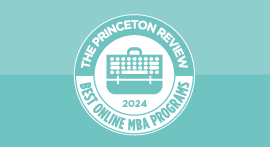
You’ve thought long and hard about your goals and have decided that an MBA is crucial to your career trajectory. Now you need to figure out which type of program to enroll in.
Should you take time away from the working world for a year or two to attend school full–time, or keep your job and attend a part-time program? Are you best suited for an Executive MBA? What about online MBA programs?
As you decide among these alternatives, you should consider four major factors:
- admissions requirements
- the amount of time you're willing to commit
- cost
- career goals
Program Options
Let's start by looking at a (very) brief overview of your choices.
| Program | Length | Professional Experience | Schedule |
|---|---|---|---|
| Full-time MBA | 1–2 years | 3+ years | Full time courseload |
| Part-time MBA | 3+ | 0–3 years | Evening classes allow students to keep working full-time |
| Online MBA | 2 years | 0–3 years | Personalized schedule to be followed from home |
| Executive MBA (EMBA) | 2 years | For execs with 8+ years | Generally meet on weekends to accommodate student's busy work schedule |
| Early Career MBA | 2+ years | For recent college grads | Full time courseload |
| Global MBA | 1–2 years | For execs (middle- and upper-level managers) from all over the world | Full-time courseload |
| Certificate Programs* | 1–2 semesters (varies by school) | Not required | 4 to 6 courses |
* A certificate program is not an MBA, but it does confer expertise in important business fields and can therefore be quite valuable.
Read More: GMAT vs GRE: Which Should You Take?
Choosing the Right Program for You
When weighing your options, consider these four questions.
1. Admissions Requirements: Are you Experienced?
The amount of work experience required varies greatly between programs. There are some full-time programs (like those offered as part of a five-year BA/MBA degree program) that require little or no work experience. Most full-time programs, however, require at least three years of post-undergraduate professional experience. If you are a recent college grad, you might want to consider an Early Career MBA program. Part-time programs typically prefer three years of work experience, although they will admit students with less. EMBA candidates, on the other hand, often need at least eight years of professional experience at the management level. Certificate programs typically have the least stringent admissions requirements; work experience is rarely required.
You may be tempted to fast-track your career by entering an MBA program directly after college. This suits some, but many find the experience disappointing because they lack the practical knowledge necessary to apply what they learn in the classroom. In addition, they can contribute little to classroom discussion.
2. Time Commitment: Are We There Yet?
If you want the degree as soon as possible, you should consider enrolling in a full-time program. Some deliver the degree in as little as 12 months. Part-time programs often require three to four years, although students with undergraduate degrees in business can sometimes place out of certain coursework. Both EMBA and online programs generally take two years to complete. Between work and school obligations, EMBAs are extremely time-consuming; prepare to forfeit nearly all of your free time if you pursue this option. Highly-ranked online MBA programs, on the other hands, offer flexibility in terms of how many credits you take per semester, or how long it takes you to complete the program (Read what the current online MBA students we surveyed have to say about work-life balance). If you're looking for a quick fix, a certificate program may be the way to go. At Wharton, for example, certificate programs consist of four to six courses that students typically complete over two semesters. That's a relatively small commitment that can yield big rewards
3. Cost: Who Pays?
Graduate degrees aren't cheap. Some scholarship money is available for full-time MBA students, but awards tend to be less generous than at the undergraduate level. In many cases, students enrolled in part-time, EMBA, and certificate programs receive partial or full reimbursement from their employers. There's a catch, of course—most reimbursement programs require recipients to remain with the employer for a number of years after earning their degree. And if your employer has no reimbursement program, you will foot the bill.
Read More: Find Your Business School
4. Career Goals: Upgrade or Clean Break?
If you want to improve your position with your current employer, a part–time or certificate program is a good fit. Each allows you to enhance your professional skills and increase your value. Best of all, you can usually do it at your employer's expense. And don't forget online MBA programs, which allow you to complete your courses from home or work.
If, however, you are looking to start a new career or find a new job, a full–time program is probably your best bet. A part-time program will slow your progress, and one of the main incentives to study part-time (employer reimbursement) probably won't be available. Look for online programs that offer plenty of opportunities to network with professors and fellow students (usually during weekend immersion projects).
You can find program offerings, admissions requirements, and tuition costs in our business school profiles.
Practice for the GMAT
Take a GMAT practice test with us under the same conditions as the real thing. You'll get a personalized score report highlighting your strengths and areas of improvement.
Read More

Find MBA Programs Matched to Your Interests
Explore our featured business schools to find those that are looking for students like you.

Top Online MBA Programs
On a mission to increase your salary? Our Top 50 Online MBA ranking is based on academics, career outcomes, tech platforms, and more.

Best Career Prospects
Find out which schools have the best track records for getting students jobs—and the highest starting salaries.

Top Schools for Entrepreneurship
Ready to build your own business from the ground up? Check out these 50 graduate programs.